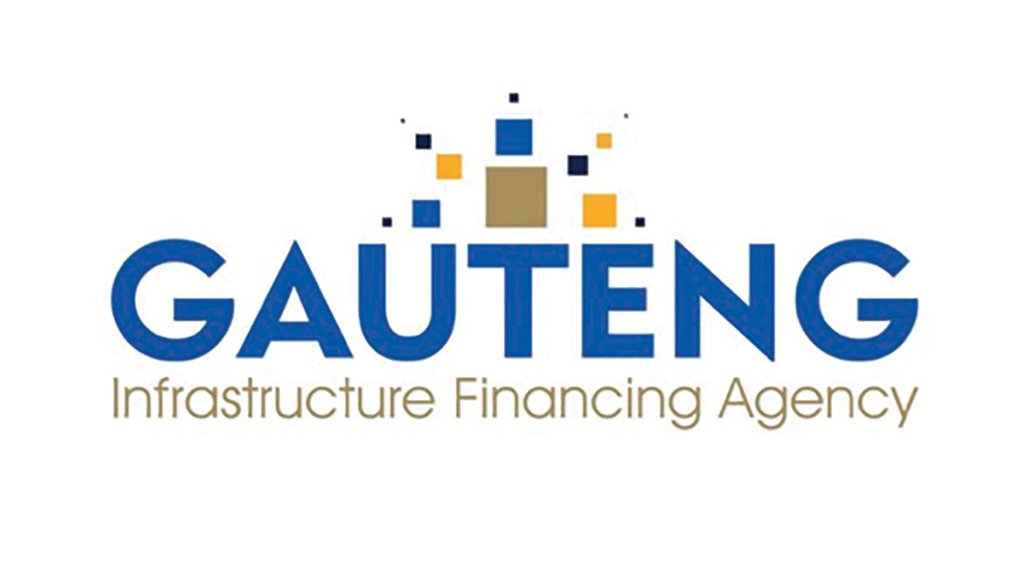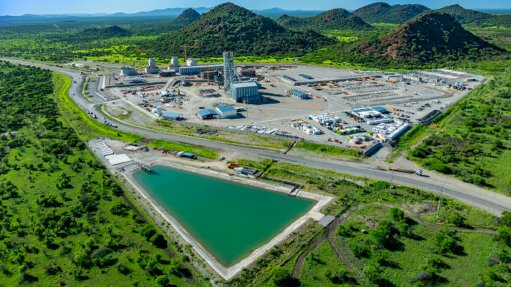Advancing alternative financing of infrastructure projects
The Gauteng Infrastructure Financing Agency (GIFA) has experienced significant portfolio growth in recent years as it continues to implement its mandate of raising alternative funding for off-budget strategic infrastructure projects.
The GIFA, which was established as a government component within the portfolio of the MEC responsible for Finance and e-Government in Gauteng in October 2014, has developed a strong pipeline of projects in different phases of development and aims to incorporate at least two new projects into the portfolio per financial year.
Serving as a one stop service to provincial departments, municipalities and agencies, the agency provides innovative financing solutions from various sources, such as private equity funders, development finance institutions, grant and donor funders locally and internationally, for key infrastructure projects.
The GIFA, which has successfully converted projects from concepts or ideas to bankable proposals, also supports provincial departments and municipalities with planning, management and other technical expertise to deploy infrastructure more efficiently and effectively and address challenges around infrastructure delivery capacity and skills.
To date, 74% of the R157-million allocated to the Project Preparation Facility, a recoverable grant facility that is used to fund project development cost, has been committed, says MEC for Finance and e-Government Nomantu Nkomo-Ralehoko.
This led to the funding and completion of more than 20 feasibility studies for infrastructure projects, estimated to have a value of more than R25-billion, that have been sourced from provincial departments and municipalities over the past six years.
Having built a strong presence within the province, the GIFA’s most critical focus is delivering robust and sustainable infrastructure project preparation, with priority given to municipalities that are in distress.
The GIFA is significantly progressing projects such as the Rooftop Solar PV: Phase 1, which will reach financial close in August, and the Innovation Hub: Enterprise Building 3 (EB: 3), which will reach financial close in July, with both set to start construction this year.
The successful financing and implementation of the Rooftop Solar PV Phase 1 project will result in the installation of solar photovoltaic panels on 107 rooftop areas of 11 provincial hospitals to harness nearly 10 MW of their own electricity.
The public-private partnership (PPP) project is expected to reduce energy costs, mitigate carbon footprint and alleviate the burden on the national grid.
Government will purchase power from the private sector partner through Purchase Power Agreements, while supporting the objectives of Gauteng’s Integrated Green Energy Strategy.
The rooftop solar panels will be installed at George Mukhari Hospital, Charlotte Maxeke Hospital, Laudium Hospital, Mamelodi Hospital, Tembisa Hospital, Yusuf Dadoo Hospital, Carltonville Hospital, Tshwane Hospital, Heidelberg Hospital, Edenvale Hospital, and Steve Biko Hospital.
The development of the Innovation Hub, a science park offering a number of incubation programmes in the bio-economy, including agroprocessing, pharmaceutical, smart industries and advanced manufacturing and the green economy, entails the design, construction and financing of Enterprise Building 2, which is awaiting maximum tenancy to start construction, and EB: 3.
An agreement is due to be signed soon which will result in the South African National Space Agency, as an anchor tenant, occupying 3 000 m2 of the lettable space of EB: 3 for a period of 10 years.
The agreement, which includes a private party that will design, finance, construct, operate and maintain EB: 3 over a 45-year period, is a significant milestone that could attract smart industries, green economy companies and high-value added service industries to take up occupancy within the hub.
A high-level market study, undertaken in September 2021, confirmed that there is substantial potential for future developments in the Innovation Hub in the medium- to long term, particularly for digital entrepreneurs, companies involved in green economy activities, information and communications technology and high-tech sectors, as well as life-sciences. The pharmaceuticals sector was also identified as having the capacity to support the future development of the Innovation Hub.
Meanwhile, GIFA has been working with the Gauteng Growth and Development Agency in conceptualising and developing the Jewellery Manufacturing Precinct (JMP) on a 6.5-hectare piece of land designated as an Industrial Development Zone within the OR Tambo International Airport Precinct. The construction of the jewellery manufacturing hub has started and is expected to be completed later this year.
Nkomo-Ralehoko highlights that the partnership has enabled two more developments in the JMP vicinity, the first of which is the In2Food Group factory, which is a premium prepared food and beverage business delivering innovative packaging solutions for retailers such as Woolworths and other international customer retailers. The factory is operational and has unlocked more than 500 job opportunities.
The second development is the Super Block, which is an office park that will house the agencies and logistics companies that offer services to the industries in the precinct.
In line with provincial government’s commitment to support the revival and reinvention of the economies within the Southern and Western Corridors, GIFA has completed the feasibility study and business case of the Sedibeng Fresh Produce Market, which entails the refurbishment and modernisation of the existing market, increasing its size and introducing an agroprocessing component.
GIFA and the municipality are working with the National Treasury to deliver this R500-million project as a PPP, whereby the private party will finance, build and operate the fresh produce market.
The project, which is expected to be released to market in 2022 after National Treasury’s approval, is expected to create about 6 000 direct and indirect jobs and positively impact the gross domestic product of the region.
In the Western Corridor, GIFA has been working with several stakeholders to establish the multi-stakeholder Bokamoso BaRona Initiative, which has identified a number of projects for development and implementation on a short, medium- and long-term basis.
Through the establishment of a progressive partnership, the African Development Bank has made available $500 000 for the development and preparation of the projects under the auspice of Bokamoso BaRona.
The agency is working on the Merafong Bio-energy Park and the West Agripark projects during this financial year.
The GIFA is also working on Merafong Solar Farm Cluster project and is preparing identified land parcels for a private party to finance, develop and operate the solar farm cluster.
The GIFA is also currently exploring innovative financing solutions to fund the Gauteng Schools Programme and Waste to Energy projects in the City of Johannesburg.
Equitable share cuts to education amid the national fiscal consolidation have impacted negatively on the affordability of the Gauteng Schools Programme to build 60 schools through a PPP model, Nkomo-Ralehoko explains.
As a result, the GIFA is exploring alternative fund raising opportunities such as donor and grant funding for the programme, which has already been registered with the Presidential Infrastructure South Africa.
The GIFA is also working with the Development Bank of Southern Africa’s Infrastructure Fund to apply for a grant from the National Treasury’s Budget Facility for Infrastructure.
Meanwhile, the funding of the Waste to Energy project, which is at an advanced stage of being released to the market, will entail blended financing through a budget facility for infrastructure grant and fiscal allocation, the success of which would lead to similar projects being sought in other municipalities.
A partnership with the European Investment Bank is also currently being finalised, with focus on supporting the Alternative Waste Treatment Technology projects in the three metropolitans of Gauteng Province.
The partnership will enable long term debt financing at concessional interest rates that will bring down the cost of the project. The partnership will also be able to crowd-in other financiers on similar kinds of projects.
The GIFA also forms part of the Gauteng Provincial Government’s Infrastructure War Room that is working on unblocking challenges and accelerating infrastructure delivery in the province.
Placing the GIFA projects into the War Room will assist in ensuring that there is an integrated and concerted effort to resolve project challenges, particularly when GIFA needs urgent approval or clearing of red tape by the owner departments. The War Room will also assist with decisions on budget requirements.
Article Enquiry
Email Article
Save Article
Feedback
To advertise email advertising@creamermedia.co.za or click here
Press Office
Announcements
What's On
Subscribe to improve your user experience...
Option 1 (equivalent of R125 a month):
Receive a weekly copy of Creamer Media's Engineering News & Mining Weekly magazine
(print copy for those in South Africa and e-magazine for those outside of South Africa)
Receive daily email newsletters
Access to full search results
Access archive of magazine back copies
Access to Projects in Progress
Access to ONE Research Report of your choice in PDF format
Option 2 (equivalent of R375 a month):
All benefits from Option 1
PLUS
Access to Creamer Media's Research Channel Africa for ALL Research Reports, in PDF format, on various industrial and mining sectors
including Electricity; Water; Energy Transition; Hydrogen; Roads, Rail and Ports; Coal; Gold; Platinum; Battery Metals; etc.
Already a subscriber?
Forgotten your password?
Receive weekly copy of Creamer Media's Engineering News & Mining Weekly magazine (print copy for those in South Africa and e-magazine for those outside of South Africa)
➕
Recieve daily email newsletters
➕
Access to full search results
➕
Access archive of magazine back copies
➕
Access to Projects in Progress
➕
Access to ONE Research Report of your choice in PDF format
RESEARCH CHANNEL AFRICA
R4500 (equivalent of R375 a month)
SUBSCRIBEAll benefits from Option 1
➕
Access to Creamer Media's Research Channel Africa for ALL Research Reports on various industrial and mining sectors, in PDF format, including on:
Electricity
➕
Water
➕
Energy Transition
➕
Hydrogen
➕
Roads, Rail and Ports
➕
Coal
➕
Gold
➕
Platinum
➕
Battery Metals
➕
etc.
Receive all benefits from Option 1 or Option 2 delivered to numerous people at your company
➕
Multiple User names and Passwords for simultaneous log-ins
➕
Intranet integration access to all in your organisation






















